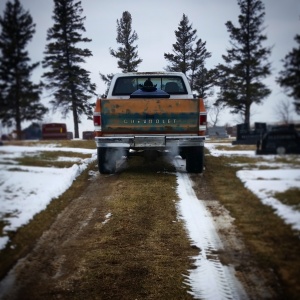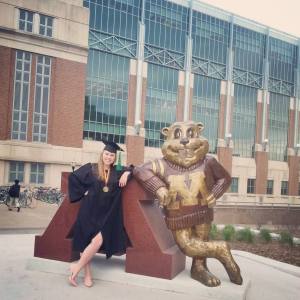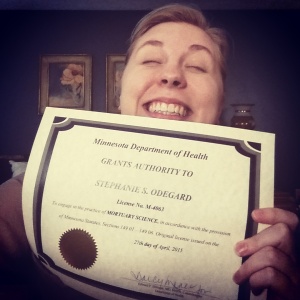Today’s post comes out of countless inquiries regarding WHY and HOW one becomes a Mortician. To start, I’ll give a little background history.
Growing up in small town Minnesota, my family and I knew practically everyone. For this reason, I had been to countless visitations and viewed several embalmed bodies all before the age of five. They always had a greasy, orange concoction smeared on their hands and faces. The older I got, the more I thought to myself, “I could do a much better job than that.” Being exposed to the concept of death at a very young age has helped me deal with death in my own life.
The first difficult loss I can remember was the death of a woman who was my neighbor and childhood babysitter. Her name was Evie. I remember my mother describing to me that Evie was sick. She had melanoma – skin cancer. When we visited her in the hospital, I just remember thinking about how much she didn’t look like herself. The whites of her eyes were now yellow and her body seemed so weak. I knew that death was imminent, but I prayed that God would perform a miracle and heal her. After all, Bible school taught me that God does those sorts of things.
I remember her funeral. It was so emotional for me, but I tried to remain strong. One of her sons was only a few years older than me and it made me question my reality. I was probably around eight years old and frightened by the thought of my parents dying. This was the first time the concept of mortality truly hit me.
On Easter morning of April 2007, our house phone rang shortly after 5:00 a.m. A few minutes later my mother burst into my bedroom in disbelief, telling me my grandpa Everett died. My family got ready quickly and hurried over to my grandpa’s house. When we arrived, my eldest uncle was just sitting at the dining room table in shock. Grandpa was hunched over in the bathroom, lifeless. As tears started pouring down my uncle’s cheeks, he got up and hugged my mom. This was the first time I had ever seen him cry. It was the first time anyone in my immediate family had passed away during my lifetime.
An hour or so went by and the funeral director, Jeff, arrived to pick up my grandpa. Due to the narrow halls and stairway, Grandpa was taken out of the house using a body bag. After Jeff left with my grandpa, the adults finished making phone calls to notify relatives and soon everyone was on their way to the funeral home to make arrangements.
The ride to the funeral home was a half hour of total silence. This gave me an opportunity to reflect on my feelings—lost, hurt, confused, and devastated that he was gone. Easter is a day of celebrating new life, but instead I was slapped in the face by death. It was as if Good Friday lingered on. Soon, however, my feelings had to be put aside. It was time to face reality. He was 83 years old, 280 pounds, and diabetic. No longer could his lungs and heart keep up with him. Realizing this allowed me to come to terms with his death.
I reflected on these childhood memories the summer before my freshman year of college as I felt nudged into a career in funeral service. Here are my Nine Steps to Becoming Licensed!
STEP 1: TALK TO A MORTICIAN
My first step was calling our local funeral director, Jeff. He invited me to stop by the funeral home for a tour and told me some of his best stories. Captivated by Jeff’s description of the embalming and planning processes, my curiosity grew. I learned that being a funeral director means respectfully taking care of the deceased, carrying out funeral plans in an organized manner, and in many cases, bending over backwards to ease the burden for families. It also demands so much sacrifice of your personal life and is extremely demanding of your time. Evaluate if this job is truly right for you. The many facets of the job was a challenge I was willing to accept; this career was something I saw myself doing. If you’re able to job shadow, I highly recommend it!

STEP 2: DO A SKILLS CHECK
Do you have an aptitude for business, science, communication, technology, psychology, graphic design and event planning? Do you possess a skill set that will help you serve families effectively? Can you think and react quickly in situations? Are you able to separate sympathy from empathy? Do you feel like you can’t imagine anything but helping others?
Originally I wanted to pursue a career in psychology and assist those who go through the stages of grief. I took a few psychology and sociology courses and realized I needed to work with people on a more personal, not clinical, level. I felt called to serve those in mourning, but I was uneasy about how ‘old school’ funeral service was. I felt called to do unique, personal, & non-traditional funerals for people that don’t fit the standard one-size-fits-all funeral. I felt called to give families a proper & meaningful goodbye with their loved one.
For more information on discovering your skill set, go to 16personalities.com and discover (FOR FREE!) more about who you are & what your strengths are. You can also take the amazingly insightful StrengthsFinder test by Gallup, but there is a cost to this.

STEP 3: RESEARCH YOUR STATE’S REQUIREMENTS
Every state in the U.S. has their own set of requirements for licensed Morticians. Research the requirements your state has on becoming a licensed Funeral Director and/or Embalmer to find out what steps you’ll need to take.
In the State of Minnesota, it is a requirement that all licensed Morticians must:
1) be 21 years of age or older
2) have a four-year degree or equivalent and must graduate from a college of funeral service education that is accredited by the ABFSE (American Board of Funeral Service Education.)
3) Pass the National Board Examination as well as a state licensing examination.
4) Complete a 2,080 hour internship or equivalent with educational clinical rotations.
5) Apply for license.
STEP 4: APPLY FOR MORTUARY COLLEGE & GET ACCEPTED
Look into the college’s prerequisites & complete them, fill out applications & essays, and cross your fingers! I attended the University of Minnesota’s Mortuary Science program. It is the only program for funeral service in Minnesota and one of the only colleges in the U.S. with a four-year degree in Mortuary Science. The program takes anywhere from one to two years to complete.
*Note: don’t vomit on your first day of embalming class. Everyone will bet you’ll be the first to drop out. No one wants to be that girl. I was that girl.
STEP 5: APPLY FOR SCHOLARSHIPS
Apply for as many scholarships as you possibly can! I really cannot stress this enough. Your program will more than likely have a huge list of annual scholarships you can apply for. This could equal thousands of dollars for you!
I had the incredible fortune of becoming a finalist for the 2014 SCI (Service Corporation International) Scholarship where they put me on an all-expenses paid trip to Houston, Texas for three days. I stayed at the Woodlands Resort where I competed with 29 other aspiring funeral directors. Fifteen people would receive $500 scholarships and the other fifteen would win the grand prize and receive $3,000 scholarships. There were cameras and over 20 judges. The interview process was rigorous & it felt like I was on a reality show. I met so many amazing peers and industry leaders. Before heading back to the airport, they took us to the National Museum of Funeral History in Houston, Texas. The day after the competition an SCI liaison called to inform me that I was chosen to receive the $3,000 scholarship and I was speechless.
STEP 6: GRADUATE & PASS BOARD EXAMS
Study. Work your butt off. Know your stuff. Network with other industry professionals. Study some more. Celebrate your accomplishments.

STEP 7: BECOME AN INTERN
Learn from great people and perfect your approach.

STEP 8: GET THAT LICENSE!
Apply for your license and rejoice when it arrives at your doorstep!

STEP 9: WORK, WORK, WORK, WORK
My experiences related to death at a young age have shaped how I view life & my decision to pursue a career in mortuary science. Funeral service has allowed me to experience the fragility of life and create deep connections to strangers in a matter of days. Funeral service has taught me that each day is truly precious, to live my life fully and without regrets. It has taught me that death can be beautiful, that death gives true meaning to our life.








you were interning and were at my aunts funeral in Comfrey it was awe inspiring to see that little girl I saw grow up turn into such a caring professional
LikeLike
Awww, thanks Deanna! I appreciate your support!!
LikeLike